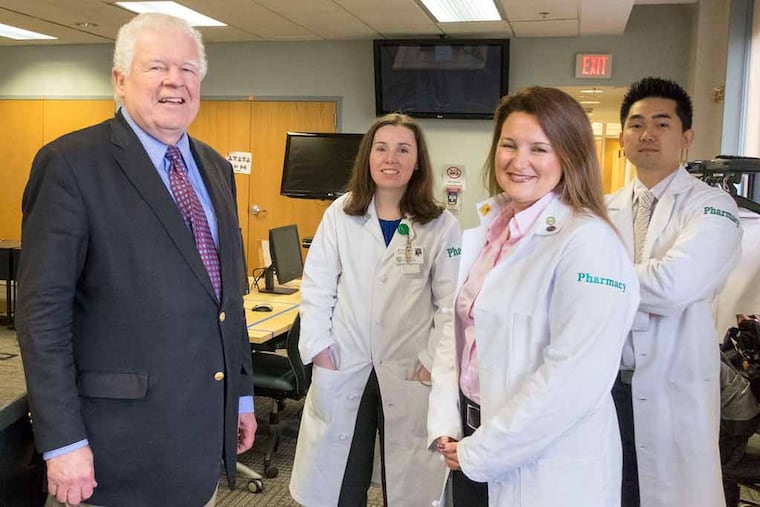New lesson: Pharmacists get to care for beloved mentor
When Emily Inverso, a pharmacist at the Hospital of the University of Pennsylvania, saw the name pop up on the emergency room admissions board, she did a double take.

When Emily Inverso, a pharmacist at the Hospital of the University of Pennsylvania, saw the name pop up on the emergency room admissions board, she did a double take.
"I said, 'There's no way there could be another Dan Hussar.' "
As soon as she could, she went up to the patient's room and knocked on the door frame.
"Do you remember me?" she asked.
"He said, 'Keep talking.' And before I could say another word, he said, 'Emily Inverso.' After so many years and so many students, he remembered."
From April through September, variations on this scene played out repeatedly as Hussar, a pharmacy professor at the University of the Sciences for five decades, battled acute myeloid leukemia.
Through the chemotherapy, through the loss of strength and appetite and the thoughts of mortality, Hussar was repeatedly cheered by reunions with his former students in the six-year doctoral program. Only now, they were pharmacists on his treatment team in HUP's oncology unit.
Kate Burdalski, Class of 2013, went to his room with a chocolate milk shake when no other food seemed to interest him.
Frank Suplick (2011), who works the night shift, brought him magazines and newspapers. The two men would talk into the early morning about baseball and hockey and reminisced about how Hussar had helped Suplick through academic difficulties.
There was Tracy Krause (2008), discussing the newest developments in anti-cancer drugs with her former professor.
And there was Inverso (2007), bringing pastries and tomato pie from a bakery in South Philadelphia.
"There were multiple experiences that were so fulfilling," Hussar, 74, said in an interview at his office, where he's back at work after hospital stays that totaled about 90 days. "I could not have been in a better place. The experience with the students was just wonderful.
"And it delighted me to talk with the physicians and nurses and hear from them the high regard they had for the pharmacists."
Now in remission, Hussar is back on campus teaching. But David Kim, a 2004 graduate of the program, said Hussar never really stopped working: "He was always a teacher, even when he was a patient."
When Hussar felt up to it - and he said he usually did - current students would visit him at the hospital and discuss their projects.
"Even when he wasn't feeling great, he was positive," Kim said. "He was one of the best patients I ever worked with."
"He was so positive and upbeat," added Denise Bauer, Class of 1999. "Never once did I see him frustrated or angry. Maybe those emotions went through him, but he was always so happy to see you."
But it was more than Hussar's attitude that kept his former students coming back, Bauer said.
"He knew how to push you. He did it without judgment. He was a father figure to many of us."
Hussar had never before experienced a life-threatening illness and extended hospital stay. No surprise to his students, he treated his time at HUP as a learning experience.
He was surprised, for example, to find that the over-the-counter allergy medication Claritin, for reasons no one has figured out exactly, can block bone pain from the anti-cancer drug Neupogen. That's a lesson he has incorporated into his course on non-prescription medications.
"You still think of him as your teacher but [now] the dynamic had changed," Krause said. "He really wanted to learn."
Hussar said he also learned about gratitude - both for the support of his students and also for that of his wife and family. And to have lived as long as he has. A lasting impression for Hussar was seeing a young patient walking along the oncology unit wheeling a cart with intravenous tubes and thinking, "He might not live until he's 30."
He says he does think about retirement, just not quite yet.
He has often taught the sons or daughters of former students, but he has another goal to reach.
"Maybe when I see the first grandchild," he said, "then I'll interpret it as a signal that it's time to retire."
@paulj1940